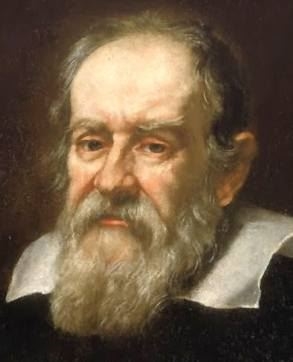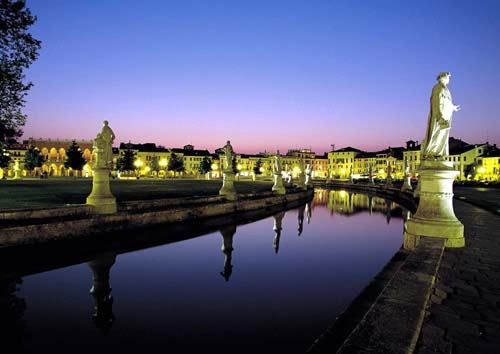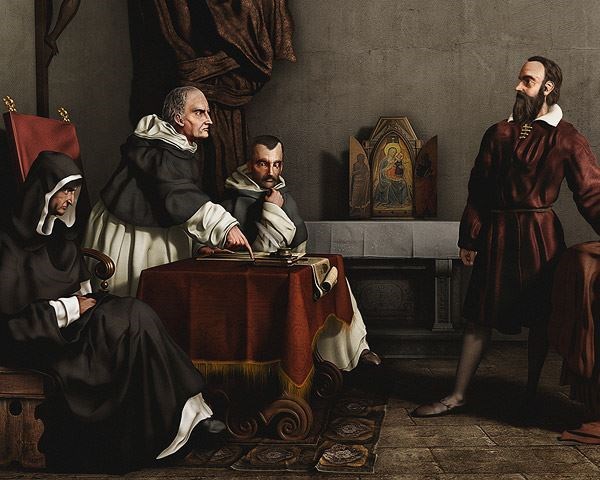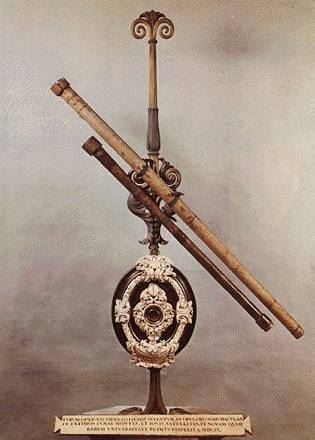 |
| Galileo Galilei (http://www.brackwedergymnasium.de/gymbrack/projekt_deutsch/gruppe3/hp02z/Wissenschaftswende.html) |
Galileo Galilei, a famous astronomer, came to be the first to outright question the ideas of Aristotle. Throughout his life, he worked hard and failed many times. His father wished him to be a major in medicine, but he decided he did not like it. Many inventions were made by him, including the clock, pipe, and the telescope. The telescope came to be known as one of his best inventions. The 1600’s was a cruel and “dim” time. Galileo was one of the intelligent few who were headstrong enough to go against hundreds, possibly thousands of people to make his theories true, even though they weren’t popular at the time. He is a hero because he faced the Catholic Church, where many would back away from, and he was put under house arrest for the rest of his life.
 |
| University of Padua (http://www.padova.infm.it/salasnich/oneday/) |
Galileo, a smart and intelligent man, invented many things and brought many new ideas to the people of Europe.
"Galileo was born in Pisa, Italy on February 15, 1564. His family belonged to the nobility but was not rich. In the early 1570’s, he and his family moved to Florence. In 1581, Galileo began studying at the University of Pisa, where his father hoped he would study medicine. In 1592, Galileo was appointed professor of mathematics at the University of Padua. Galileo made his first telescope in 1609, modeled after telescopes produced in other parts of Europe that could magnify objects 3 times. He created a telescope later that same year that could magnify objects 20 times." (Van Helden).Through mathematics and science, Galileo was able to invent many things in his lifetime that not only helped others in his life, but others in the future.
 |
| Galileo Faces the Inquisition (http://www.0nd.org/Projects/Galileo-facing-the-Roman-Inquisition/) |
Galileo, who risked everything to make what he believed true to others, repeatedly warned by an institution in the Catholic Church known as the Inquisition who were, “charged with the eradication of heresies. A committee of consultants declared to the Inquisition that the Copernican proposition that the Sun is the center of the universe was a heresy” (Van Helden). Galileo strongly believed in the Copernican proposition, which put himself in danger by the Inquisition. Galileo continued his efforts in persuading others that the sun is the center of the universe, the Inquisition did not like that. “Galileo was called to Rome in 1633 to face the Inquisition again, Galileo was found guilty of heresy for Dialogue, and was sent to his home near Florence where he was to be under house arrest for the remainder of his life” (Van Helden). Galileo risked everything to persuade others, even though it did not seem to make much impact at the time.
 |
| Galileo's Telescope (http://www.wwnorton.com/college/english/nael/18century/topic_3/illustrations/imtelescope.htm) |
Through the use of engineering and intelligence, Galileo was able to make many great inventions. Galileo faced a problem at one time when he visited the Arsenal. “In 1593, he was presented with the problem involving the placement of oars in galleys. He treated the oar as a lever and correctly made the water the fulcrum. A year later, he patented a model for a pump. His pump was a device that raised water by using only one horse” (Van Helden). Galileo changed the system for moving boats at the time, making things much easier for “oar men”. His next idea or invention came to be known as the clock.
“While at the University of Pisa, Galileo began his study of the pendulum while, according to legend, he watched a suspended lamp swing back and forth in the cathedral of Pisa. However, it was not until 1602 that Galileo made his most notable discovery about the pendulum - the period (the time in which a pendulum swings back and forth) does not depend on the arc of the swing (the isochronism)”(Van Helden). These inventions helped the people in the future by a vast amount, from observatories to clock towers, to even motorized boats.
Through use of Science and mathematics, Galileo occurred to be one of the brightest scientists in the world at the time.
“He was the only scientist of his time to gain international recognition in mathematics, physics, and astronomy. This enabled him to bring mathematics to physics and (eventually) bring physics to astronomy. In so doing, he helped place modern science firmly on course. Ideally, science has a dual role: It approaches questions theoretically by soundly predicting the outcome of “events,” and then it proves those predictions through sound experiment and observation. Galileo’s experiments, backed by mathematical models and proofs, paved the way for Isaac Newton’s formulation of the three laws of motion.” (Rogers).Through the use of the telescope, Galileo was able to discover many other moons on different planets and see further into space. With his new invention, he found out that the Earth is not the center of the universe, but the Sun.
“Continuing his studies of the heavens, Galileo made observations of sunspots, Saturn, and Venus. He noted that, much like the moon, Venus progresses through phases. This fact confirmed his doubts about Ptolemaic astronomy and deepened his conviction of the truth of Copernicus' theory that the earth and planets revolve around the sun. Announcements of these findings, beginning in 1610, increased Galileo’s fame as an astronomer.” (Rogers).Galileo uses his knowledge of astronomy and physics to discover that the Earth revolves around the sun. Not the other way around, which he was ridiculed for believing it, was wrong. Galileo, intelligent and bright, came to be known as one of the greatest astronomers of the time.
Page created on 5/30/2010 12:00:00 AM
Last edited 5/30/2010 12:00:00 AM
